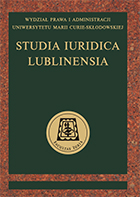Ochrona praw dziedziców koniecznych na ziemiach polskich w XIX i XX w.
Protection of the Rights of Necessary Heirs in the Polish Lands in the 19th and 20th Centuries
Author(s): Mariola Szewczak-DanielSubject(s): Civil Law, Recent History (1900 till today), 19th Century, Geopolitics
Published by: Wydawnictwo Naukowe Uniwersytetu Marii Curie-Sklodowskiej
Keywords: necessary heirs; legitime; reserve; civil code; German civil code; Austrian civil code; Napoleonic Code; testament; inheritance;
Summary/Abstract: The aim of the paper is to review the institutions of the inheritance law regulating the issues of protection of necessary heirs’ rights, that is legitime and reserve, legally binding in the Polish lands in the 19th and 20th centuries. In the context of divergence between the two institutions, their essence is briefly discussed and major differences between their regulations are presented. Moreover, in the summary, the author analyses advantages and disadvantages resulting from the systemic and legal solutions of the presented institutions. A fundamental principle of the modern inheritance law is the rule of free disposition of one’s property in the event of death. However, the rule of free bequeathing has been limited in its material aspect through protection of necessary heirs’ rights, which had its institutional expression in the legal solutions adopted in the inheritance laws of the 19th-century European civil codes. The essence of the protection of necessary heirs’ rights consisted in the fact that they could not be excluded from succession without justification. In modern civil codifications, the institutional expression of legal protection of the closest family members was the system of legitime (known in the Austrian civil code – ABGB and the German civil code – BGB) and the system of reserve (regulated in the Napoleonic Code).
Journal: Studia Iuridica Lublinensia
- Issue Year: 25/2016
- Issue No: 3
- Page Range: 893-906
- Page Count: 14
- Language: Polish

